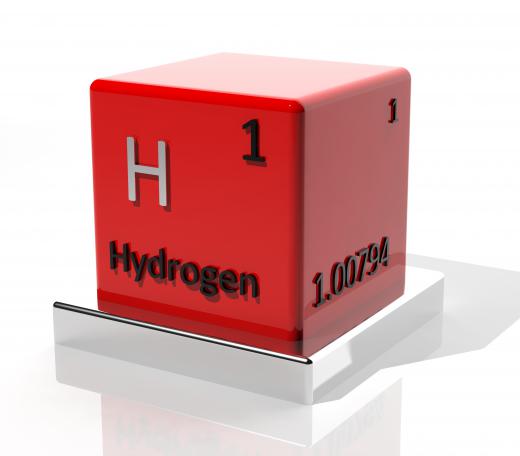What is Hydrogen Combustion?
Hydrogen combustion is the process by which hydrogen reacts with an oxidizing agent and burns. Hydrogen combustion is an exothermic combustion, meaning that it releases heat energy. Endothermic processes, on the other hand, absorb energy. Hydrogen burns based on the chemical formula 2H2 + O2 → 2H2O, meaning that it reacts with oxygen. While it is not shown in the chemical equation, an input of energy is necessary to begin the reaction, which releases a significant amount of energy when carried through to completion.
Combustion reactions are more often simply called burning. There are two parts that are essential to combustion reactions, including hydrogen combustion: a fuel and an oxidizing agent. With the input of heat, hydrogen reacts with oxygen to release heat and light energy. The end products of the reaction include water vapor and heat. The input of heat is necessary to overcome the attractive forces between atoms and molecules; the energy released comes from the energy that was stored in chemical bonds that are broken during the reaction.

Hydrogen combustion has shown some potential for powering automobiles and generating energy to meet other human needs. However, because of the energy input needed and the comparatively low energy output, it is difficult to utilize it efficiently. Fossil fuels are more commonly used for fuel and energy, but the supply of such fuels is very limited and their combustion releases harmful gases into the atmosphere. Hydrogen, on the other hand, is a hugely abundant resource that only produces water vapor when burned. As such, energy researches are making significant progress in the development of hydrogen-based fuel cells; some have already been used in automobiles to varying degrees of effectiveness.

While it is still a relatively new area of study, there are several different kinds of vehicles that have been made to utilize hydrogen combustion because of its cleanliness and its renewable nature. Large quantities of hydrogen are actually used to launch space shuttles into space. Smaller vehicles, such as boats and motorcycles, have also been made to utilize hydrogen combustion.
One famous example of hydrogen combustion is the Hindenburg explosion. The Hindenburg was an airship that was held aloft by massive quantities of hydrogen. Something aboard the airship triggered an explosion which ignited the hydrogen, causing the massive airship to explode violently, killing 35 people. Many different theories have been put forward to explain the sudden explosion, but the true cause was never conclusively determined.
AS FEATURED ON:
AS FEATURED ON:












Discussion Comments
"The input of heat is necessary to overcome the attractive forces between atoms and molecules..." It does take energy (ignition) to separate a few atoms in the H2 & O2 molecules. It is the creation (not breaking) of new (H+O) bonds that releases a great deal more energy, some of which breaks more H2 and O2, etc. This chain reaction is a flame or explosion.
Hydrogen energy combined with nuclear energy would be a sustainable way to reduce our carbon footprint. We could drastically reduce the number of power plants necessary, and like suburban people now do with farms and agriculture, forget that we were even dependent upon plants. There is a massive amount of energy available through very sustainable means, and we are simply unable to take a global step of faith.
My father got his PhD in researching the interaction of hydrogen atoms with metal. He told me that it was feasible that we could one day use a simple coin-like piece of metal to fuel our car, using the hydrogen in the coin. If this is true, it is probable that the only thing holding science back from making such a technological advance is economic concerns on the part of large fuel monopolies.
When cars crash and light on fire, they often explode due to the gasoline. A hydrogen car would do no such thing, and paranoia concerning switching to new energy is quickly dispelled upon further research. People like to associate hydrogen with bombs, but we drink hydrogen every day in the form of H2O.
Horror stories like that of the HIndenburg and Chernobyl proffer a large amount of fear for the general public. It would be helpful if people were more rational into their acceptance of this kind of fear, since these are two primitive examples of people dealing with technologies they knew little about. When people first started using gasoline as a fuel, I'm sure there were many such accidents, and over time, gasoline came to be tamed. Types of energy like hyrdogen and nuclear energy are even safer than gasoline by a longshot, and if we switch to them, our relative security will actually increase, not decrease.
Post your comments